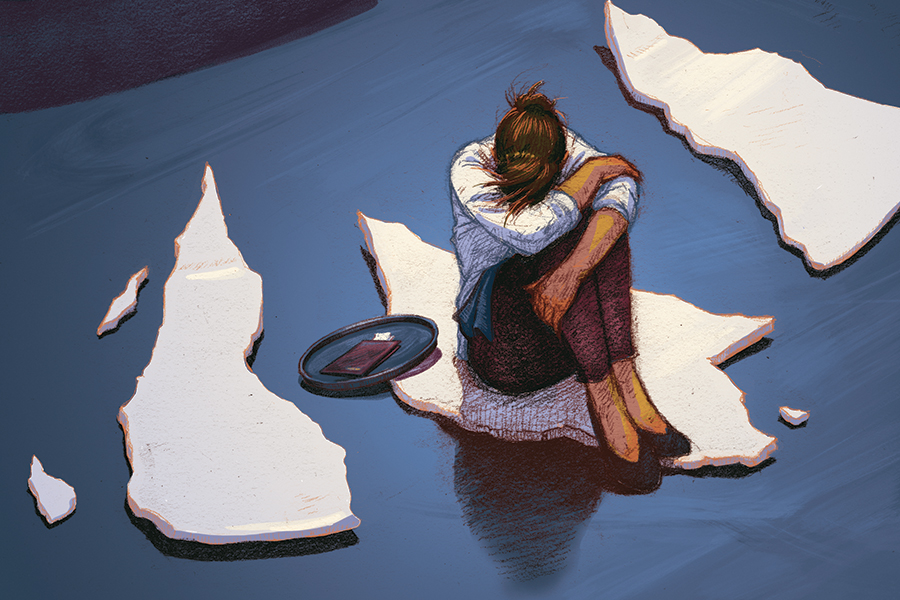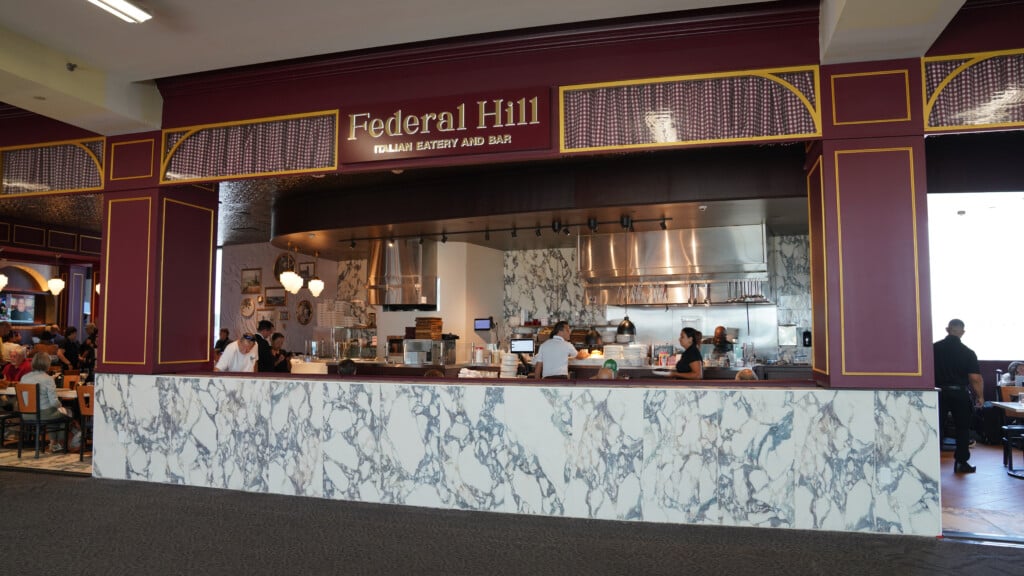(Not) At Your Service
How public-facing restaurant staff are faring in the high-stress, ever-evolving world of pandemic dining.

“It’s getting out of the city, away from everything. Finding open spaces,” says Kientz, who started running and bicycling, too. “It’s my own refuge. I go myself a fair bit, and sometimes with my partner. It’s restorative and relaxing.”
Kientz had to take temporary leave from both of his jobs in mid-December after receiving a positive COVID-19 diagnosis. He can’t pinpoint how he got it as he says he was careful about avoiding exposure. He quarantined inside his apartment apart from his partner, who took residence upstairs while he remained downstairs, unless one of them needed the upstairs bathroom or downstairs kitchen, then they switched places.
When he received the positive diagnosis, both of the businesses where he worked had to shut down. They both closed to be fully sanitized and while waiting for other staff members’ tests to come back, ruling out exposure. It was a heavy mental load to carry for Kientz.
“When I first got the diagnosis, it was around ten or eleven in the evening. I got it in an email from a PCR test that I had taken at the beginning of the day. It was a rush of a lot of different emotions,” he says. “I felt a little disbelief and fear on a number of levels. I live with my partner and she has some medical history that made this a little bit more nerve-wracking were I to expose her to it.”
His partner was diagnosed with non-Hodgkin’s lymphoma in her early twenties, and her lungs are weakened from going through the radiation treatments. Contracting COVID-19 would have put her at severe risk, Kientz says.
“I immediately thought of how the businesses where I work were going to have to shut their doors for some amount of time and I just hoped that I hadn’t passed it on to anyone,” he says.
In the end, he avoided spreading the coronavirus to his partner. And by sharing his diagnosis with his workplaces, which in turn took immediate action, he also avoided exposing coworkers and guests.
“For me, there was an element of guilt as to how I got it,” he says, “but I also recognized I had done everything I possibly could to avoid it, so you have to arrive at a place of forgiving yourself and accepting that with the rates as high as they were, that it’s practically inevitable for a lot of people.”
Kientz didn’t have any lasting symptoms from COVID-19, besides being temporarily fatigued, and he was able to return to work. But he struggled to access unemployment benefits while he was out of work.
“It took me literally hundreds of attempts to get through to the RI Department of Labor and Training to make a claim,” he says.
He filed the day after his positive diagnosis and received instructions to await a confirmation email with steps to certify for payment within seven to ten business days. Unfortunately, they had an old address on file, which kept his claim status in limbo as pending. He kept calling to correct the problem.
“I can’t tell you how maddening it was to wake up early to try and be the first to call. Dialing over and over and over on days off and before work. To no avail. I finally got through [in February] after being put on hold for fifty-five minutes,” he says. “I wasn’t able to receive unemployment for two months. I can’t imagine how bad that would be for a lot of people. Thankfully, I had some safety money set aside.”
Kientz received his first dose of the COVID-19 vaccine in late March and has resumed a full-time schedule between both jobs. But it can still be tough financially, he says. While he makes a generous hourly wage by most restaurant and bar standards, he still depends on tips. With ISCO and Bywater operating on takeout with minimal weather-dependent outdoor dining, he says some guests have a different perception of value in service.
“Like [at ISCO], ‘Should I still tip this person if I have to walk up and order and sit down and bus my own glass?’ All of these steps are purely for guest and staff safety,” Kientz says. “At some point, there needs to be a reckoning with the systems of the service industry, in general. The whole model feels like it’s up for examination.”
The mental health load is not easy to carry for managers, either. Natasha Nichols leads the teams at Chow Fun Food Group’s restaurants, including Harry’s Bar and Burger’s two locations, Ten Prime Steak and Sushi and Xaco Taco. These restaurants all shut down at the beginning of the pandemic and did not reopen for takeout until mid-May 2020. Nichols had to deliver layoffs to more than 200 employees last year.
“March 15, 2020, was the last day the restaurants were fully open and we closed on March 16 for lunch after Governor Raimondo’s call. March 17 was my birthday, and that was the day I had to lay everybody off,” Nichols says, her voice beginning to crack. She chokes up, pauses, then starts again, “and it was literally the hardest day of my whole entire life.”
The day she had to break the news, she got out of bed before the sun rose to go grocery shopping for her family. She says that was the only thing she could control at that moment. She paced the grocery store aisles making sure her family would have everything they needed at home during a period of uncertainty, including enough beloved Mickey frozen waffles for her young daughter, and says she broke down in front of a store clerk.
“The poor guy stocking the apples asked me how my day was, and I broke into tears and I was like, ‘It’s horrible. It’s my birthday. I’m about to lay everyone off,’ and he looked at me like I was nuts,” Nichols says. “Those first few days were really hard and I felt guilty from having to lay everyone off, but I couldn’t control it. I was worried about what the future was going to hold, and how we were going to come out of this.”
In the end, Chow Fun’s employees collected unemployment assistance while the restaurant group figured out how to get back up and running for takeout again. And now that all the restaurants have reopened, Nichols is more confident in how her team has handled the crisis.
“Through all of the tough moments came positive ones too,” Nichols says. “My team worked so hard and put everything they had into reopening and sustaining our restaurants, which in the end made us stronger than ever. I could not be prouder to call them my team.”
Nichols says she and other managers check in with staff to see how they are doing as restrictions ease, making sure they are okay and that they know there are options for recouping some of their lost income.
“Everyone has had their moments of being worried and concerned, but I think having people to lean on whether it’s myself or other managers has been helpful. I tell management their job right now, aside from the normal duties, is really just being there for their staff, checking in with them and making sure that they’re okay and listening to their worries,” Nichols says. “When people feel that you really do care about them, it changes the dynamic. It brings a sense of loyalty and you feel at home; you feel like it’s a career and that’s where you want to be.”
It’s up to restaurant ownership and management to support their staff and keep strict safety precautions in place even as restaurant restrictions lessen. There’s been a lot of guidance from state leadership, but Dr. Andrea says a lot of this guidance erases the workers from the equation.
“The workers are in these establishments for their entire shift with folks with their masks off, and not necessarily having the support they need to protect themselves from that potential exposure,” she says. “It’s my professional opinion that, at the moment, we shouldn’t have indoor dining open. When it comes to COVID-19, socializing maskless indoors is one of the riskiest things you can do. Studies have found that not only are folks who have tested positive for SARS-COV-2 twice as likely to have dined out in the previous weeks but workers in food service jobs are also experiencing a greater burden of COVID-19-related deaths. In the absence of vaccine prioritization for these workers, the onus is completely on individual businesses to have measures in place to support and protect their workers.”
Many places are standing behind their workers and being proactive.
“They take a firm stance with customers, like ‘No mask, no service,’ or there are rules like put your mask on when the server comes up to the table,” Andrea says. “I want to applaud those business owners because they are doing the right thing. It’s awesome they are doing the right thing, but we need it to happen more broadly.”
If you or someone you know is experiencing a mental health crisis or thoughts of suicide, call the 24/7 BH Link hotline at 401-414-LINK. Or you can use the Crisis Text Line and connect with a crisis coordinator within twenty-five seconds on average. Text HELLO
to 741741, and communicate until you feel safe.
























